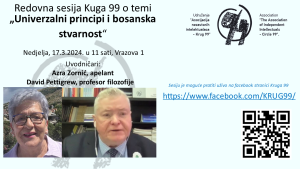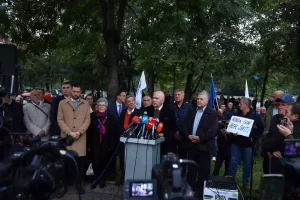Appeal to the institutions of Bosnia and Herzegovina to block the naming of a Hungarian general as EUFOR commander

| Krug 99 – Circle 99 Sarajevo, Bosnia and Herzegovina 17 August 2023 – 37 ANNOUNCEMENT OF CIRCLE 99 Appeal to the institutions of Bosnia and Herzegovina to block the naming of a Hungarian general as EUFOR commander Now it is clear to most of the public that the intention to destroy the state of Bosnia and Herzegovina is entering a final offensive stage on the part of some diplomatic, political and international actors. But, at the same time, the determination and stronger drive for civil society governance and awareness about the need for active resistance is growing. The need for an alliance of political subjects supporting a platform that defends Bosnia and Herzegovina as a democratic state could not be clearer. The marginal parts of the homeland have through several generations experienced unquestionable sensitivity toward the steady advancement of dangerous challenges now confronting their regions and all of Bosnia and Herzegovina. We are witness to expressions of defeatism and a carefully crafted political propaganda campaign against Bosnia and Herzegovina. But, at the same time there is a growing consciousness and determination about the state. The course of history will no doubt reject, or at least marginalize, those who place themselves outside the process of developing a Bosnian state consciousness. The issue of security is the most important political question today in Bosnia and Herzegovina. Underestimating this issue during current conditions while emphasizing the economy and other topics results in common political demagoguery on the part of irresponsible people in the face of dangers. This only increases the role of those with bad intentions who would use confusion to manipulate the citizenry. The political pathology of [Croatian President] Zoran Milanovic and [Republika Srpska President] Milorad Dodik is characterized by their obvious advocacy of the condemned ‘joint criminal enterprises’ against Bosnia and Herzegovina. This is obvious to anyone who respects morality and recognizes responsible behavior toward the state and social order. Their open glorification and personal identification with Karadzic and Mladic, as well as with other agents of crimes against the people and against the constitutional order of Bosnia and Herzegovina, are clear indications of this. Of course, this pathological campaign will be a historic failure. But, it is equally true that the seductive rhetoric of neofascism might well today capture the lowest passions of the masses and encourage the power of the insensitive and unfeeling towards the death and suffering of the innocent. In the final analysis, we need to reject the illusion that outdated expansionist and openly territorial pretensions of Serbia and Croatia toward Bosnia and Herzegovina can be stopped by common sense or “special” compromises at the expense of the free development of the state on the model of all democratic and prosperous nations in the world. A political system based on the liberal democratic principle of “one person – one vote” is not an Islamic trick. Rather, it is a proven Western democratic standard and reflects the inalienable right of every person to equality and political fraternity. Hegemonic rhetoric and political projects aim at preserving ethnic domination and elimination of the rights of the Bosnian nation as a community of all its citizens, regardless of ethnic/national, religious, territorial and other multifaceted identities. This should be unmasked and quickly rejected in the interests of peace and security in this part of the world. It is clear that illiberal and autocratic regimes in the region and beyond have their collaborators and allies in the Balkans and in Bosnia and Herzegovina. Their obsession is the creation of a new world order, based on ethno-nationalism and autocracy. This is dangerous for peace in the world and especially in Bosnia and Herzegovina. It means open support for those who would destroy the existing constitutional order and advocate for the continued division of the country. Hungarian Prime Minister Viktor Orban encourages Milorad Dodik in his separatist intentions, as does Hungarian Minister of Foreign Affairs Peter Szijjarto, among other things through pressure against the judicial system of Bosnia and Herzegovina. They also support [leader of the Croat nationalist party in Bosnia] Dragan Covic, who wants to revise the Election Law of Bosnia and Herzegovina in harmony with “Christian values,” including the solidifying of discrimination along ethnic lines. All of this would be reason enough for a reaction by the responsible institutions of Bosnia and Herzegovina. In fact, the Ministry of Foreign Affairs and the Presidency of Bosnia and Herzegovina have a clear political basis for proposing that the responsible institutions of the European Union block the naming of Hungarian General Laszlo Sticz as the new commander of the EUFOR mission in Bosnia. Our experience with the forces of separating the “warring parties,” which resulted in creating internal borders within Bosnia and Herzegovina, would be reason enough for appropriate caution and timely reaction. Hungary’s most senior leaders are supporting the separatist intentions of Milorad Dodik, while he also enjoys protection from possible (and desirable) EU sanctions. More recent reports point to Hungary’s influence and behind-the-scenes engagement in the ethnic-based formation of government in Bosnia and Herzegovina. All this is ample evidence that under no circumstances should the naming of Hungarian generals be allowed for the position of commander of the EUFOR/Althea mission in Bosnia. This would constitute a grave danger for the state of Bosnia and Herzegovina. Respectfully, Adil Kulenovic President of Circle 99 adil.kulenovic@krug99.ba |
| Association of Independent Intellectuals – Circle 99 (Bosnian: Krug 99), a leading Bosnian think-tank, was established in Sarajevo in 1993, in the midst of the Bosnian war (1992-1995), while the capital was under siege. Circle 99 provides a platform to bring together intellectuals of various professional and ethnic identities; university professors, members of the Academy of Sciences and Arts of Bosnia and Herzegovina, artists, journalists, entrepreneurs, diplomats, and other prominent figures from Bosnia and from abroad. Multidisciplinary discussions and initiatives are held each Sunday throughout the academic year, in the form of regular sessions about politics, science, education, culture, economy, and other societal issues. The overall goal is to sensitize the public towards a democratic transformation, achieving and maintaining peace, and integration of modern Bosnia into the community of countries fostering liberal democracy. Circle 99 has been declared an organization of special significance for the city of Sarajevo. |







